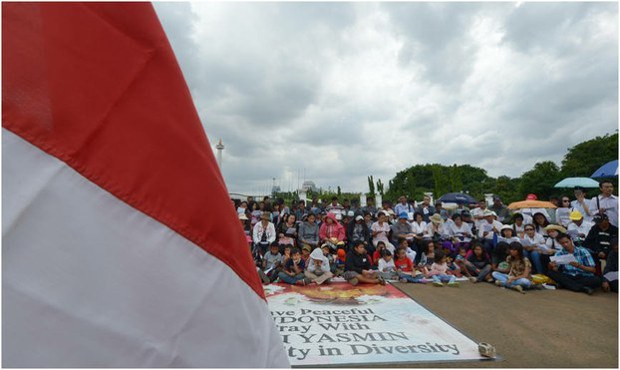Indonesian Church Challenges Relocation Plan
2015.11.11
 Members of the Indonesian Christian Church (GKI) Yasmin and another congregation pray in front of the Presidential Palace in Jakarta, Nov. 25, 2012.
Members of the Indonesian Christian Church (GKI) Yasmin and another congregation pray in front of the Presidential Palace in Jakarta, Nov. 25, 2012.
A Christian congregation in Bogor, a city in West Java, is asking Indonesian President Joko “Jokowi” Widodo to intervene over a plan by the mayor to move the church elsewhere.
“Relocation is not the solution, so why should we be moved? What is our fault,” Henrek Lokra, pastor of Indonesian Christian Church (GKI) Yasmin told BenarNews on Wednesday, as he responded to Bogor Mayor Bima Arya’s plan to move it away from the Yasmin Garden Housing Complex so as to avoid clashes with its local opponents.
Joined by representatives of other church congregations and human rights organizations, Pastor Lokra held a press conference where he asked the national government to insist that local government leaders follow the law regarding building permits for churches and other worship sites.
Christians are a religious minority in Indonesia, the country with the world’s largest Muslim population. According to Indonesian law, religious congregations with at least 90 members are required to obtain the signatures of at least 60 non-congregants from the surrounding community for permission to build a place of worship.
‘Local government’s authority’
GKI Yasmin’s pleas did not draw support from the central government.
“Frankly we haven’t heard a lot of reports on this problem. The building of a house of worship is a local government’s authority,” presidential spokesman Eko Sulistyo told BenarNews. “We would like to encourage that the problem be solved fairly as this is an old conflict.”
The church and local government have been at odds over a building permit since 2008. In 2010, Indonesia’s Supreme Court ordered the Bogor City government to restore the permit allowing the church.
The permit was revoked in 2011 based on a claim that the church had forged the signatures of residents who supported the project. City officials claim the church no longer exists since the building was sealed in 2011.
The mayor says that the church’s parent organization, Western Synod, agreed to the relocation plan, although local church members say they were not part of the discussion. The congregation has conducted Sunday worship services in front of the Presidential Palace since 2012.
The Setara Institute for Democracy and Peace, a Jakarta-based human rights advocacy group, regards this case as a symbol of intolerance in Indonesia. Over the last eight years, there have been at least 316 cases in which worship places were sealed or razed, mostly as result of disputes over building permits, according to research by Setara.







